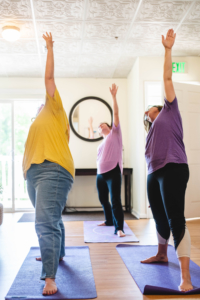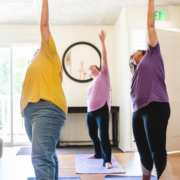Movement Therapy at IOP Level
 Colorado Recovery is now expanding services outside our signature continuum of care. We are admitting directly into our intensive outpatient program (IOP) clients who may be ready to begin their recovery at the IOP level of care, or for those in the process of stepping down from another program. One of the offerings now available at the IOP level is our movement therapy group.
Colorado Recovery is now expanding services outside our signature continuum of care. We are admitting directly into our intensive outpatient program (IOP) clients who may be ready to begin their recovery at the IOP level of care, or for those in the process of stepping down from another program. One of the offerings now available at the IOP level is our movement therapy group.
Dance/movement therapy (DMT) is defined by the American Dance Therapy Association (ADTA) as “the psychotherapeutic use of movement to promote emotional, social, cognitive, and physical integration of the individual, for the purpose of improving health and well-being.”
“The basic tenet is that emotions live in the body,” says Colorado Recovery’s movement therapist Elise Alvarez. “It’s about creating awareness around clients, and then use movement to process those emotions. In case of anger management issues, we could ask ‘Is there a specific part of your body that you feel anger in?’ Anxiety might manifest as feeling a weight in the chest.”
By expanding the awareness of such feelings, people are better able to recognize what’s happening in each present moment and then make more informed decisions about their feelings instead of simply reacting to them impulsively.
Even without verbal information, movement therapists are able to work with their clients. According to the ADTA movement is everybody’s first language. Without using words, just moving the body “can be functional, communicative, developmental, and expressive. Dance/movement therapists observe, assess, and intervene by looking at movement, through these lenses, as it emerges in the therapeutic relationship in the therapeutic session.”
Alvarez goes into each session with a couple of specific ideas to be able to address the needs of individual clients in each particular group. In one recent session, she had clients toss a ball to each other in a pattern – a kind of group juggling. The purpose of the little game was to make people “wake up a little bit and become alert to what’s happening right now,” says Alvarez.
Movement therapy has also physical benefits like improving reflexes and coordination. Group games strengthen cohesive teamwork, connecting people to each other as they work as a unit.
“Sometimes we just throw a frisbee around—just having the movement aspect makes it feel more natural and fluid. People may open up a bit more because they’re moving and not just sitting in a circle, talking.” There is also walking meditation: “Everybody is paying attention to bodily sensations while walking, catching the mind should it start to wandering off,” says Alvarez. “At the end of a session we typically share our experience with the group. Our checkout question is often ‘How we are feeling right now?’”
For more information about direct admission to our intensive outpatient program or our other services, connect with a specialist who can answer your questions at (720) 218-4068.





